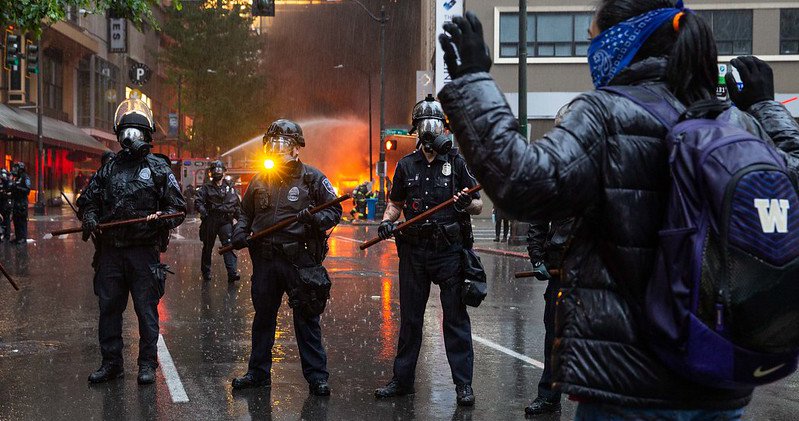In his 2013 book Time No Longer: Americans after the American Century, the journalist Patrick Smith considers how the crisis of the American political system relates to the country’s break with the idea of history. For two centuries, America’s guiding myth was the idea that revolutionary cataclysms and social conflicts had been left behind in the Old World, on the other side of the Atlantic. The heaven on earth of biblical prophecy had arisen in America.
In this mythos, American democracy and institutions are not merely rational, they represent the embodiment of divide perfection – that eternal and indestructible “city upon a hill.” America’s role, as the embodiment of the end of history, is to bring this good news to an imperfect world, destroying dictatorships and spreading democracy. The idea that its own political system may be imperfect, or even turn out to be an obstacle to a better social order, is therefore the greatest challenge to the American idea.
So today’s protests, which some have already heralded as the “beginning of the end of the American experiment” are about more than police racism. A key driving force behind them is a deep awareness of the need for radical change – not reforms to a perfectly engineered system, but the desire to replace the entire mechanism and start anew. This is a crucial difference between what we are witnessing in America today and the protest waves of the 1960s which, despite their radical rhetoric, nonetheless retained faith in American values – which, in their true form, were seen as fundamentally egalitarian, despite their distortion by the power of ignorance and prejudice.
Given the extreme polarisation between President Donald Trump and the protesters, neither side is willing to reconcile on the basis of democratic values. This is a fundamental clash between two opposing visions of what their country should be. Compromise may well be impossible. Perhaps we are witnessing the “end of history” thaw, and American posthistoricism along with it. That development should force outside observers to seriously consider unknown alternatives to the current order of things.
Where does that leave Russia?
In stark contrast to America, Russia’s self-perception is strongly extra- or non-historical. Russia’s “special path” is closely tied to the supposed static and inescapable nature of the country’s political and social structure. This trope has dominated Russian conservative thought since the mid-19th century. In this narrative, there is simply nowhere for freedom to progress, just an eternal repetition of the same tragic formula. The protagonists of this story are steely authoritarians, starry-eyed intellectual dreamers, and indistinct masses whose self-destructive instincts must be restrained at any cost.
But now, history has invaded. It strives to upset this balance, offering only disaster and the prospect of turning life as we know it upside down. Over the past 20 years, the idea that Russia has “reached the limit on its number of revolutions” was the key ideological message of the Putin regime. The proposed amendments only formalise this “historical fatigue” in the Russian constitution – although, as will soon become clear, they do not enjoy majority support.
Russia is fatigued from its fatigue with history. Russia desperately searches for an exit, wherever it may lead, from its vicious and self-perpetuating historical cycle.
These are at the heart of Russian society’s deep unease – an unease which, surprisingly, is closer to America’s protest mood than many would like to admit.
Translated from Russian by Maxim Edwards
Ilya Budraitskis | Radio Free (2020-06-12T15:24:01+00:00) Russia, George Floyd, and the end of the imaginary West. Retrieved from https://www.radiofree.org/2020/06/12/russia-george-floyd-and-the-end-of-the-imaginary-west/
Please log in to upload a file.
There are no updates yet.
Click the Upload button above to add an update.
